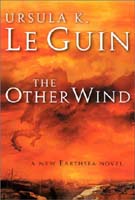The Other Wind
(This review originally appeared in Mythprint 38:11 (#236) in November 2001.)
Reviewed by David Bratman
One of the most memorable images in Ursula K. Le Guin’s classic A Wizard of Earthsea was of the dry lands, the otherworld where the dead go: the hillside where a simple wall of stones marks the border between the lands of living and of dead, which the living can see only in trance or dream, and must not cross. Le Guin explored the dry lands further in her third Earthsea book, The Farthest Shore. Now she returns and wrests the complete meaning and significance from it, in an expedition into the roots of the very nature of Earthsea, and of life and death in it.
The Other Wind follows up on major plot threads from Tehanu and Tales from Earthsea as well as from The Farthest Shore. It will read more easily if you know all three of these, but an adventurous new reader can pick up what needs to be known. I like all of Le Guin’s work, but I enjoyed this book more than its two immediate predecessors, and I suspect readers less sympathetic to her writing will like it better too. It is less cryptic, and less didactic. There are no crude antagonists here, only people trying to understand each other. Even one character repeatedly shown up as foolish is sympathetic.
The story begins with Alder, a village sorcerer having disturbing dreams of the dry lands. He visits Ged, the retired Archmage, who gives him comfort and simple work to do (and a cat!). Without Ged, Alder goes to the king’s city in Havnor, then to the wizards’ isle of Roke. In these places he learns that his dreams are associated with other disturbing events. He meets royalty, councillors, mages, and dragons. He wonders why they keep him around. But they know that in the end Alder will be the one to realize what must be done.
This is a very directed novel, focused on its ending, but less so than this summary may imply. After arriving at Havnor, Alder ceases to be the only viewpoint character. The relations between each pair of a cast of nearly a dozen are important. It’s a very political fantasy, and a very theological fantasy, and it shows how these can be written without the hack and bloat so common to the subgenres. For it is also a short novel, and a gentle one.


